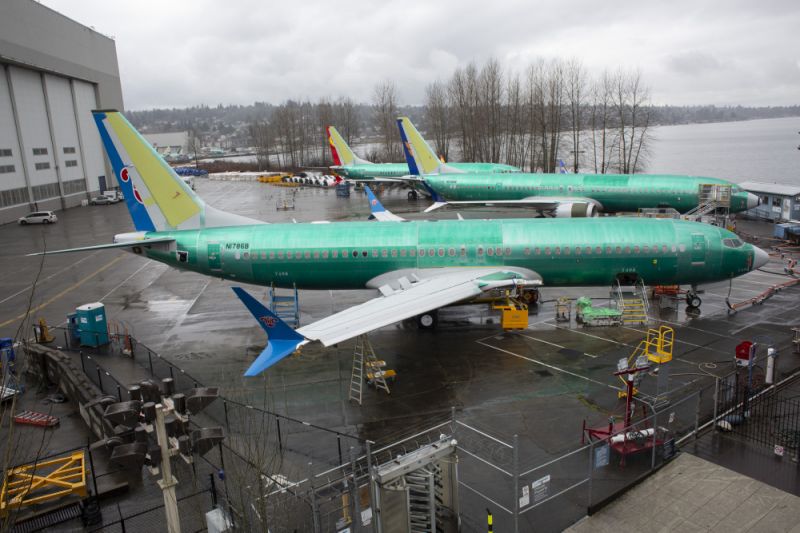Media Report

- The New York Times reports, "American intelligence spending could rise to nearly $86 billion, a 6 percent increase that reflects the Trump administration's proposed boost in defense and national security spending and a renewed focus on threats from Russia and China. The director of national intelligence, Dan Coats, released the overall proposed budget for American intelligence agencies on Monday, and the Pentagon also released its proposed intelligence spending for the fiscal year starting in October. The budget covers expenses as diverse as spy satellites, cyberweapons and the C.I.A.'s network of overseas spies and informants. But neither the administration nor Congress releases details about the so-called black budget, which is classified. The proposed spending increase comes despite President Trump's sometimes tempestuous relationship with his intelligence agencies and his public comments in late January that his spy chiefs should 'go back to school.'"
- The Washington Post reports, "Taiwan and the U.S. will hold talks later this year as part of upgraded efforts to counter Beijing's growing pressure on the island for political unification. The talks planned for September in Taipei will include a senior official from Washington, de facto U.S. ambassador to Taipei William Brent Christensen said Tuesday. Christensen didn't say whether the consultations are meant to provoke China or push it to make changes. The U.S. has formal diplomatic relations with China but maintains strong ties with Taiwan though the American Institute in Taiwan, its de facto embassy in Taipei, which has recently undergone a major upgrade in facilities. 'We believe it's possible to have a good relationship with Taiwan and a good relationship with China at the same time,' Christensen said at a news conference. 'Things we do with Taiwan should not be regarded as things that we are doing because we are seeking to provoke China or vice versa.'"
- Bloomberg reports, "China is looking at excluding Boeing Co.'s troubled 737 Max jet from a list of American exports it would buy as part of a trade deal with the U.S., people familiar with the matter said. Boeing jets were featured on a draft list of American products China would buy to reduce its trade surplus with the U.S., the people said, asking not to be identified discussing private deliberations. Now, safety concerns are pushing China to examine whether to cut the 737 Max from the list altogether or replace it with other Boeing models after the crash of a plane operated by Ethiopian Airlines led to the aircraft being grounded worldwide, they said. A reduction in aircraft purchases could make it harder for China to fulfill an offer it's said to have made to pare its $300-billion-plus annual goods trade surplus with the U.S. over six years, and potentially delay any overall agreement between the two countries."
Calendar
- 2019-03-18 Xi to Visit Europe in Bid to Offset Concerns, Boost Trade
- 2019-03-17 Trade Fight With China Enters Overtime, With Tariffs a Costly Sticking Point
- 2019-03-15 Amid skepticism, China fast-tracks foreign investment law to show goodwill to Washington
- 2019-03-14 Huawei pleads not guilty to U.S. charges in New York court
- 2019-03-13 Donald Trump’s trade chief warns that China talks could fail
- 2019-03-12 China’s ban on the Boeing 737 Max inspires others, ramps up pressure on U.S. regulator
- 2019-03-11 Drop Huawei or See Intelligence Sharing Pared Back, U.S. Tells Germany
- 2019-03-10 Trump Kept Allies at Bay in China Trade Talks
- 2019-03-08 Chinese Officials Becoming Wary of a Quick Trade Deal
- 2019-03-07 China GDP overstated by 12%, research finds
News
- The New York Times Trump Administration Proposes $86 Billion Spy Budget to Take On Russia and China
- The Washington Post Taiwan, US plan new talks this year in rebuke to Beijing
- Bloomberg China Considers Excluding Boeing 737 Max From Trade Deal
- Reuters China's Xi urges teachers of political courses to tackle 'false ideas'
- Axios As U.S. eyes China, Europe wonders if it could fend for itself
- Bloomberg Forget Tesla, It's China's E-Buses That Are Denting Oil Demand
- Reuters Huawei leads Asian domination of U.N. patent applications in 2018
- The New York Times A Forgotten Italian Port Could Become a Chinese Gateway to Europe
- Bloomberg China, Pakistan Vow to Strengthen Counter-Terrorism Cooperation
- The Wall Street Journal In Tug of War With China, Taiwan Fights to Avoid Being Deserted in the Pacific
- Reuters Indian traders burn Chinese goods in protest over blacklisting veto, trade
- The Atlantic When China Convinced the U.S. That Uighurs Were Waging Jihad
- Reuters Israel's chip sales to China jump as Intel expands
- CNBC China's new social media craze: Paying random people to shower you with over-the-top compliments
- TIME China's Goths Rushed to the Defense of a Woman Asked to Remove Her Black Makeup on the Subway
Commentary
- Brookings Democracy, the China Challenge, and the 2020 elections in Taiwan
- Foreign Policy U.S. Firms Are Helping Build China's Orwellian State
- The Diplomat In Search of 'Real' Data on China's Economy
- Bloomberg Think Drugs Are Expensive in the U.S.? Just Try China
- The Wall Street Journal China's Rise Means Trouble in Paradise
- Forbes Why China's Stock Market Is In Beast Mode
- The Hill There is never a good time for a trade war